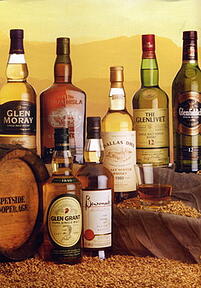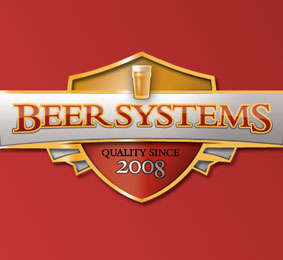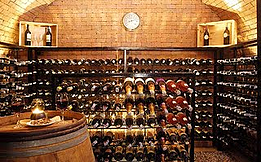 Single Malt Whisky is a whisky made from only one type of malted grain and distilled at one particular distillery. Single malts are traditionally made from barley cultivated near the distillery concerned, although there are some single malt rye whiskies. Most single malt whiskies are distilled using a pot still. Single malts are typically associated with Scotland, though they are produced elsewhere, notably in Ireland and Japan. All single malt goes through a similar batch production process, as outlined below. At bottling time various batches are mixed together or vatted to achieve consistent flavors from one bottling run to the next. Some variation does occur.
Single Malt Whisky is a whisky made from only one type of malted grain and distilled at one particular distillery. Single malts are traditionally made from barley cultivated near the distillery concerned, although there are some single malt rye whiskies. Most single malt whiskies are distilled using a pot still. Single malts are typically associated with Scotland, though they are produced elsewhere, notably in Ireland and Japan. All single malt goes through a similar batch production process, as outlined below. At bottling time various batches are mixed together or vatted to achieve consistent flavors from one bottling run to the next. Some variation does occur.
Water is first added to the barley to promote germination and then mixed with ground barley grist to create a mash. Water is also used later in the production process to dilute most whisky before maturation, and added once again before bottling.
Most distilleries use different water sources in the various steps, and this becomes a crucial part of the character of the end product.
Barley, yeast and water are the only ingredients required in the production of single malt whisky.
The barley used to make the whisky is "malted" by soaking the grain in water for 2-3 days and then allowing it to germinate to convert starch (which is insoluble in water and not available for fermentation by yeast) to fermentable sugars.
The malt is milled into coarse flour (grist), and added to hot water to extract the sugars.
Yeast is used to ferment malted barley in washbacks. Yeast is added to the wort in a large vessel (often tens of thousands of liters) called a wash back. Wash backs are commonly made of Oregon pine or stainless steel. The yeast feeds on the sugars and as a by-product produces both carbon dioxide and alcohol. This process is called fermentation and can take up to three days to complete. When complete, the liquid has an alcohol content of 5 to 7% by volume, and is now known as wash. Up until this point the process has been quite similar to the production of beer.
Source: Wikipedia (http://en.wikipedia.org/wiki/Single_malt_whisky)

 If we perform inventory in our establishment, the question of proper inventory scheduling is one that has certainly arisen. Inventory scheduling in the most part should be consistent with specific events that occur in your business. For instance, if your accountants prepare monthly profit and loss statements, inventory scheduling should reflect a need for monthly data collection and analysis.
If we perform inventory in our establishment, the question of proper inventory scheduling is one that has certainly arisen. Inventory scheduling in the most part should be consistent with specific events that occur in your business. For instance, if your accountants prepare monthly profit and loss statements, inventory scheduling should reflect a need for monthly data collection and analysis.  Hotel inventory software
Hotel inventory software Share the success!
Share the success!
 Beer systems need to be broken down in two sections, bottled beer and draft.
Beer systems need to be broken down in two sections, bottled beer and draft.  There are many people who describe themselves as bar consultants, but simply sitting at a bar and ordering a drink does not make us specialized in the field. If you are considering a bar consultant for your business, it is a good idea to understand what they can bring to your company in terms of information.
There are many people who describe themselves as bar consultants, but simply sitting at a bar and ordering a drink does not make us specialized in the field. If you are considering a bar consultant for your business, it is a good idea to understand what they can bring to your company in terms of information. 

